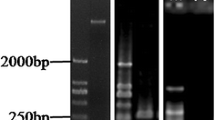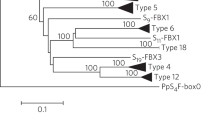Abstract.
We had previously studied the cause of breakdown of self-incompatibility in a natural population (designated U1) of Petunia axillaris subsp. axillaris (Solanaceae) identified in Uruguay. This population contained mostly self-incompatible and some self-compatible plants. We had found that an S-haplotype, S 13 , carried by three self-compatible individuals (U1-2, U1-16, and U1-22) was functional in the pollen, but not in the style, and that S13-RNase was not detected in the styles of these individuals. This defective haplotype was designated S 13 sps, with "sps" standing for "stylar-part suppression". In this work, we further investigated the molecular and genetic basis of this suppression. We isolated and sequenced cDNAs for S13-, S1- and S15-RNases, and used them as probes to show that the transcript of the S13-RNase gene was not detectable in U1-2 (S 1 S 13 sps), U1-16 (S 13 sps S 15 ), or U1-22 (S 13 sps S 13 sps), but the transcript levels of the S1- and S15-RNase genes in U1-2 and U1-16, respectively, were normal. Genomic blotting analysis revealed that the S13-RNase gene was present in these three self-compatible plants. The S-genotypes obtained in bud-selfed and normally selfed progenies of these three plants were determined. Analysis of these S-genotypes led us to propose a model invoking a modifier locus, named MDF, to explain the suppression of the expression of the S13-RNase gene in the genetic background of the self-compatible plants carrying the S 13 sps-haplotype.
Similar content being viewed by others
Author information
Authors and Affiliations
Additional information
Electronic Publication
Rights and permissions
About this article
Cite this article
Tsukamoto, T., Ando, T., Kokubun, H. et al. Breakdown of self-incompatibility in a natural population of Petunia axillaris caused by a modifier locus that suppresses the expression of an S-RNase gene. Sex Plant Reprod 15, 255–263 (2003). https://doi.org/10.1007/s00497-002-0161-5
Received:
Accepted:
Issue Date:
DOI: https://doi.org/10.1007/s00497-002-0161-5




